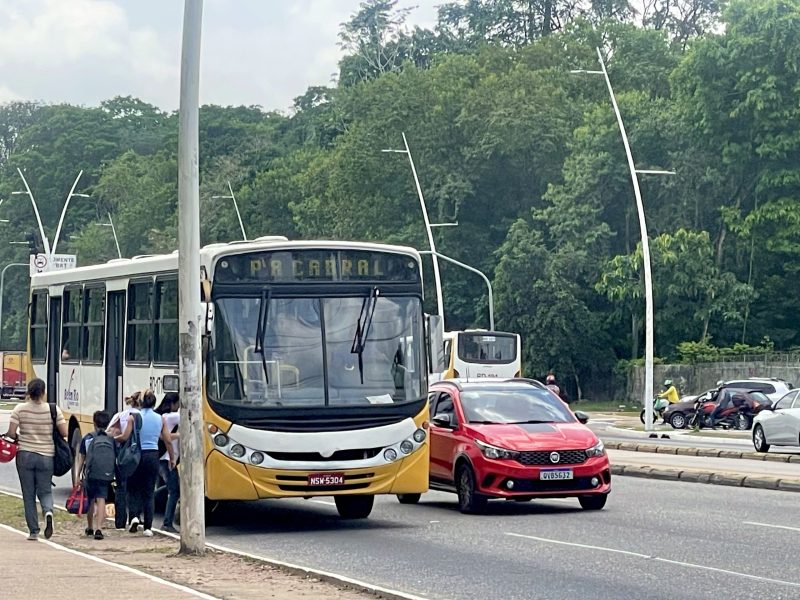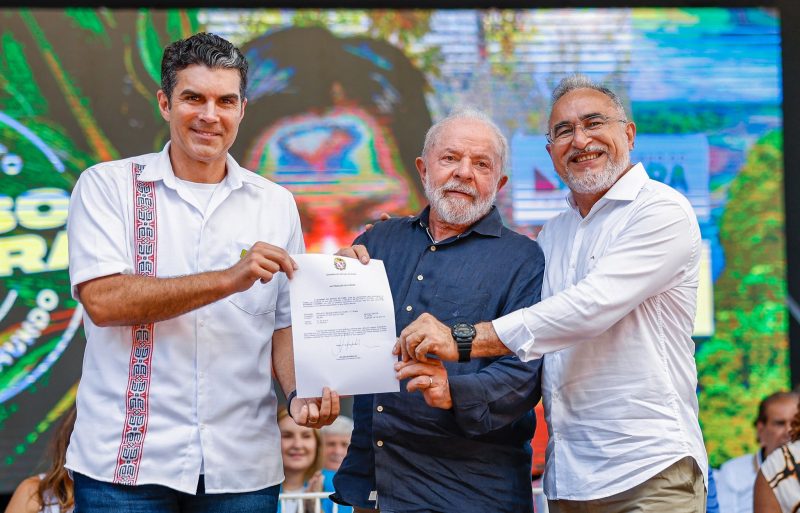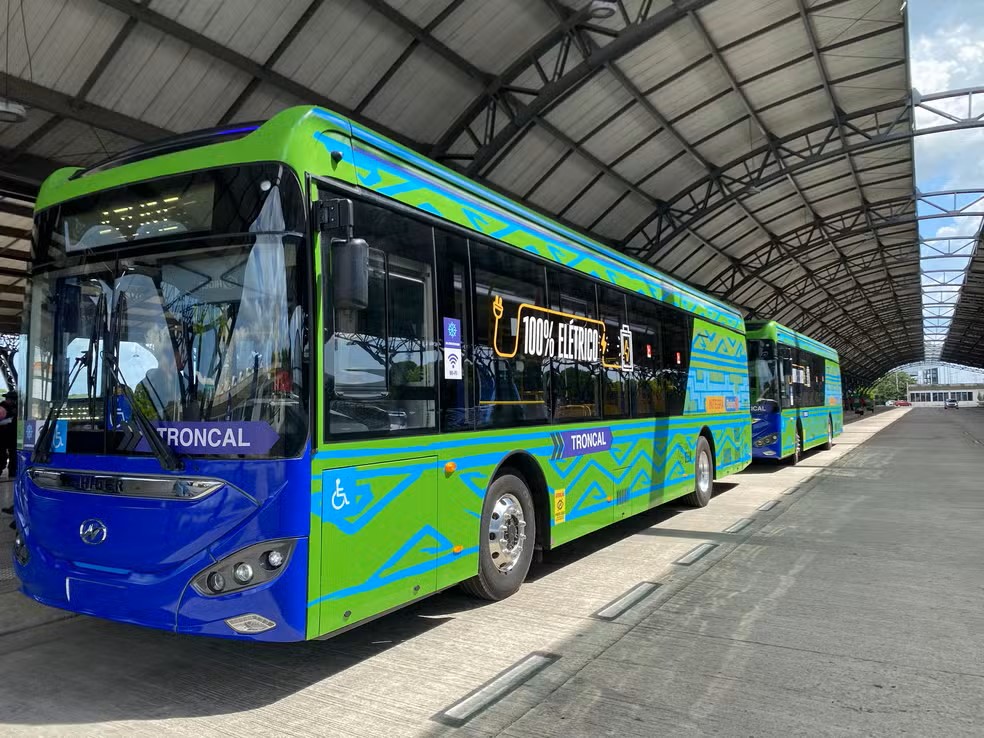A plan for new buses in the Brazilian city hosting the 2025 UN climate summit was held up by a political row that suggests the road to COP30 could get rocky
A recent row over a small fleet of air-conditioned electric buses, intended to improve travel for stressed passengers in the Brazilian city of Belém – the host city for the 2025 UN climate summit – suggests local politics could complicate preparations for COP30 in the Amazon.
“The first time I travelled by bus in Belém it was very difficult. It was so stuffy – there were so many people. It was so hot, I almost got sick,” José Martin, 26, an exchange student from Guinea, told Climate Home at a bus stop near Mangueirão stadium, a busy area of the city.
Belém has 870 public buses that carry around 470,000 passengers a day – but they lack cooling in a city where temperatures can rise to 34 or 35 degrees Celsius on Amazonian summer afternoons from July to November. Most of the buses are old, and users complain about broken seats and frequent breakdowns.
Candidates in mayoral elections have made campaign promises to modernise the bus network – also a hot topic among city councillors. But it was the prospect of hosting a global climate conference in November 2025 that boosted the push for a new, air-conditioned fleet.
The first five state-of-the-art electric buses for a pilot project were delivered in early July and should have been on the road already. The vehicles – with a range of 270 kilometres and capacity for 76 passengers – are the same model used to ferry delegates around during COP28 in Dubai.
However, their deployment was held up by a dispute between Belém City Hall and the local political opposition, which lasted for nearly two months until it was resolved at the end of August.

Old buses continue to circulate in Belém (Photo: Alice Martins Morais)
Soon after the buses arrived in the city, the Municipal Audit Court (TCMPA) published a precautionary measure, suspending the purchase contract for the initial batch of 10 buses issued by the Belém Executive Secretariat for Urban Mobility (Semob). The decision alleged flaws including overpricing and lack of planning.
In response, Semob’s head, Ana Valéria Borges, said the cost – which works out at R$3.6 million (around $636,500) per bus – took into account taxes and changes in import tariffs.
The left-wing Socialism and Freedom Party (PSOL) – of the city’s current mayor, Edmilson Rodrigues – claimed the suspension was an attempt to benefit the opposition’s mayoral candidate, Igor Normando of the centrist Brazilian Democratic Movement (MDB) party. He is backed by his cousin, Pará state governor Helder Barbalho, who is a key player in the mobilisation for COP30.
The PSOL’s accusation stems from the fact that the councillor who took the decision to suspend the bus contract, Ann Pontes, was a federal deputy from 2003-2011 for the MDB party and has close ties to the Barbalho family.
In addition, Normando’s mother – an aunt of Barbalho – is secretary-general of the TCMPA, while another relative is director of the School of Public Accounts. The court did not respond to a request for comment from Climate Home.
Mayor Rodrigues himself also accused the Barbalho family of being involved in the TCMPA’s decision on social media.
🚨 Leona aqui para informar: os ônibus de Belém estão parados devido a uma decisão infundada do TCM, que questiona a compra dos veículos. E adivinha? A família Barbalho está envolvida, incluindo Hilda Centeno Normando, mãe do Igor e secretária do TCM. Fiquem atentos! 🚌👀 pic.twitter.com/OngWjXMtRJ
— Edmilson Rodrigues 5️⃣0️⃣ (@EdmilsonPSOL) August 25, 2024
This post by Mayor Rodrigues on X says: “Belém’s buses are at a standstill due to an unfounded decision by the TCM, which questions the purchase of the vehicles. And guess what? The Barbalho family is involved, including Hilda Centeno Normando, Igor’s mother and TCM secretary. Stay tuned!”
Climate Home asked the press offices of Normando and the Pará State Government to comment on this claim but had not received a response at the time of publication.
COP30 tensions feared
Political scientist Eliene Silva, a researcher at the Laboratory of Geopolitical Studies of the Legal Amazon (LEGAL), warned that political tensions between the national, state and municipal authorities over arrangements for COP30 are likely to intensify, at least in the run-up to this October’s municipal elections.
Silva noted that in 2022, when there was first talk of Belém hosting the conference, President Luiz Inácio Lula da Silva of the Workers’ Party (PT), the governor of Pará and the mayor of Belém were allies, despite their differing political affiliations.

Helder Barbalho (left to right), President Lula and Edmilson Rodrigues in June 2023, at the COP30 announcement ceremony in Belém (Photo: Ricardo Stuckert)
But in recent months, there have been signs of a split, such as in March when Mayor Rodrigues was not seen with the Pará state governor and Lula during a visit by French President Emmanuel Macron to an island in Belém.
Since Normando announced his decision to run for mayor, the division between Barbalho and Rodrigues has become more evident, although Lula’s party continues to support Rodrigues.
“This issue is closely linked to the fact that Edmilson’s administration has been very poorly evaluated by the population,” said Silva.
As well as dissatisfaction with public transport, there has been widespread criticism of chaotic management of the city’s garbage, exacerbated by the hiring of a new company for the job, leading to months of irregular waste collections before the contract started.
“I think Helder [Barbalho]’s bet is precisely to bring in a new figure [as mayor], even if they don’t have as much experience in executive positions, to guarantee the continuity of the plans he has for the capital, including COP30,” said Silva.
Far-right mayoral candidate
So far, all the main three mayoral candidates in Belém have publicly supported the hosting of COP30, highlighting it as a crucial opportunity for the city’s development.
According to the latest opinion poll released in mid-August, Normando was ahead in the race, with 36.5% of voting intentions, closely fol
Read More

